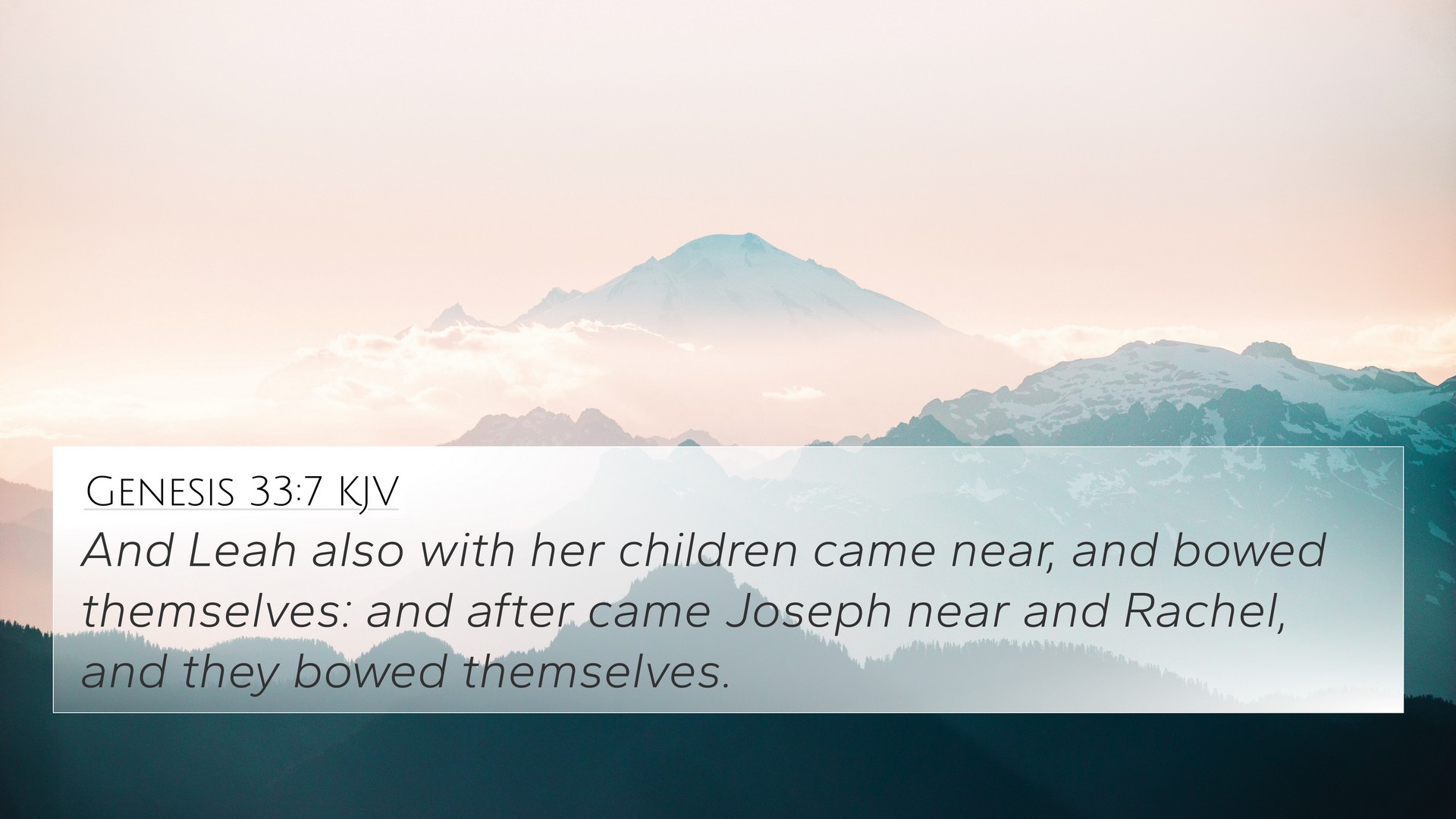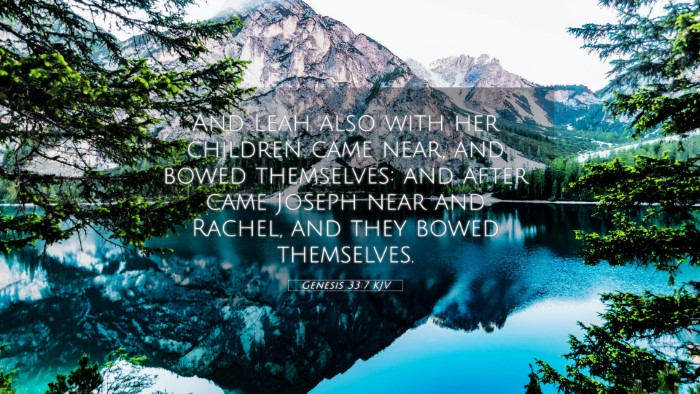Understanding Genesis 33:7
Genesis 33:7 is a significant verse in the narrative of Jacob and Esau, encapsulating themes of reconciliation, familial relationships, and emotional expression. In this verse, we see Jacob's act of humility and the genuine nature of his affection towards his brother Esau after many years of estrangement. The verse states:
"And he put the handmaids and their children foremost, and Leah and her children after, and Rachel and Joseph hindermost."
Summary of Genesis 33:7
The meaning of this verse sheds light on Jacob's careful planning for this crucial meeting with his brother Esau. He positions his family in a specific order, which reflects his character and the complexities of their past. Let's delve into the intricacies of this verse as understood through various public domain commentaries.
Commentary Insights
Matthew Henry's Commentary
Matthew Henry highlights that this verse demonstrates Jacob's strategic and protective instincts. By placing the handmaids and their children at the forefront, Jacob was likely trying to shield his favorite wife, Rachel, and their son Joseph from any potential hostility Esau might display. This positioning shows Jacob's prudence and thoughtfulness in ensuring the safety of his beloved family members.
Albert Barnes' Notes
Albert Barnes adds that Jacob's actions reveal a profound sense of humility. Rather than proudly presenting his most beloved wife and child first, Jacob's ordering suggests he understood the gravity of their past transgressions, and he wished to demonstrate his willingness to make peace first. Furthermore, Barnes notes that the mention of each individual group indicates that Jacob acknowledges each part of his family, reflecting a sense of respect for their unique positions in his life.
Adam Clarke's Commentary
Adam Clarke discusses the emotional undertones of the passage, emphasizing the tension and possible anxiety that Jacob felt. The placement of the family shows not only a protective instinct but also the emotional weight of their past separation. Clarke suggests that this careful organization not only demonstrates a tactical mindset but captures the depth of familial love and the hope for restoration and reconciliation.
Lessons from Genesis 33:7
This verse provides several lessons relevant to modern readers, such as:
- The importance of humility: Jacob’s humble approach in facing Esau is a lesson on the importance of humility in conflict resolution.
- The complexity of family dynamics: Each family member's position signifies the complexity of relationships and the influence of past experiences on present interactions.
- Strategic planning in reconciliation: Jacob's thoughtful arrangement signals that careful consideration can aid in effective reconciliation.
Bible Cross-References
Genesis 33:7 connects with several key verses throughout the scriptures that enhance our understanding of its themes:
- Genesis 32:3-21: Jacob's preparations before meeting Esau.
- Genesis 30:1-24: The dynamics of Jacob's family relationships, including the roles of Leah, Rachel, and their children.
- Genesis 12:3: The promise of blessing and the importance of reconciliation among families.
- Romans 12:18: "If possible, so far as it depends on you, live peaceably with all." A reflection of Jacob's attempt to make peace with Esau.
- James 4:10: Humbling oneself before the Lord, which is reflected in Jacob's actions.
- Matthew 5:23-24: Importance of reconciliation before offering gifts, akin to Jacob seeking forgiveness before presenting himself to Esau.
- Proverbs 15:1: "A soft answer turns away wrath," highlighting the gentle approach Jacob takes with his brother.
Exploring Connections Between Bible Verses
The connections between Genesis 33:7 and the verses mentioned above offer rich grounds for thematic Bible verse connections. They help in understanding the broader biblical narrative regarding forgiveness, reconciliation, and the role of familial duty.
How to Utilize Cross-References
Understanding how to find connections between these verses can greatly enhance one’s Bible study. Utilizing tools for Bible cross-referencing, such as a bible concordance or a bible cross-reference guide, is beneficial when exploring such concepts. Here are some methods:
- Using a bible concordance to look up key terms related to themes of reconciliation.
- Engaging in a cross-reference Bible study to discover deeper meanings and overlapping messages.
- Identifying connections between Old and New Testament messages in community discussions or structured biblical studies.
Through these methods, one may effectively dive into the profound depths of biblical texts, uncovering how Genesis 33:7 resonates with other scriptural accounts and enhances understanding of God's overarching narrative of reconciliation and peace.
Conclusion
Genesis 33:7 serves as a pivotal example of how familial relationships are navigated within the biblical text. By understanding Jacob's actions, readers can find connections not only in this narrative but also throughout the entirety of scripture, weaving a rich tapestry of themes surrounding forgiveness, humility, and the importance of addressing past grievances. This verse invites deeper reflection and study, aligning with various keywords such as bible verse parallels and functional scriptural cross-referencing.
In the pursuit of biblical knowledge, engaging with verses in light of their connections strengthens our comprehension and invites us to embrace the transformative power of scripture in our lives.


